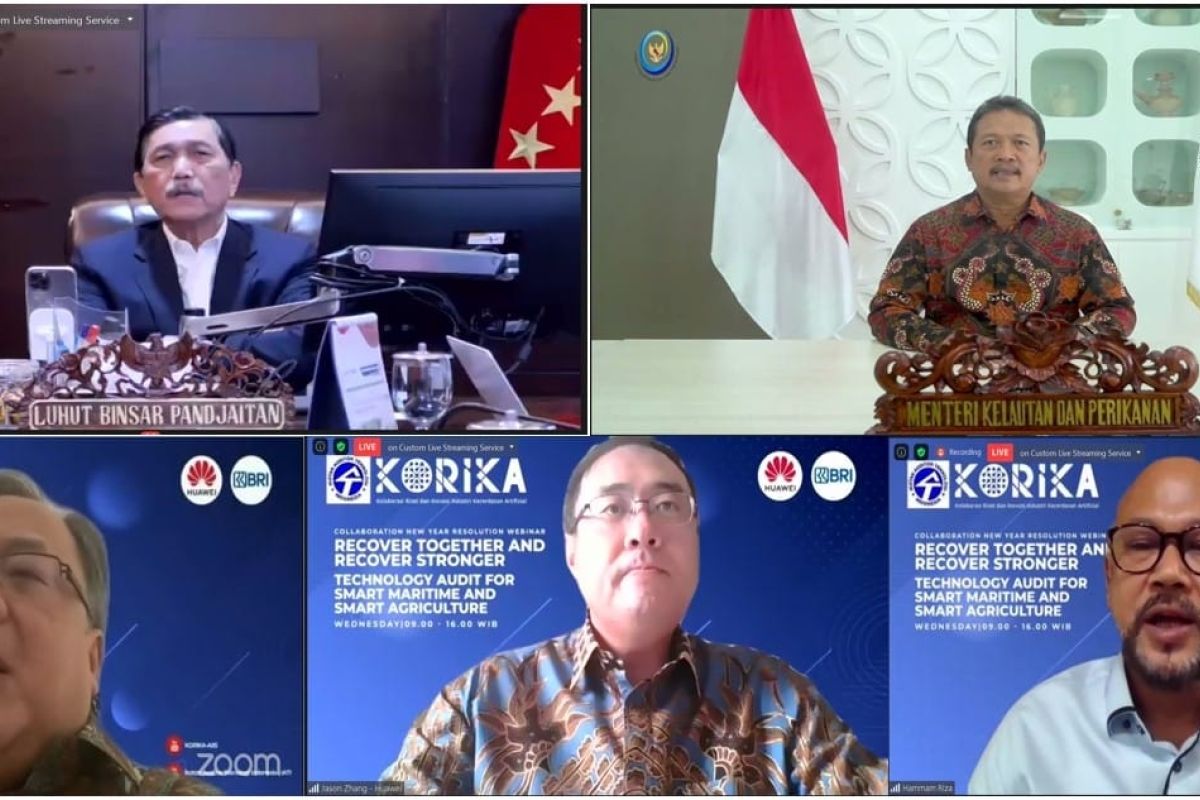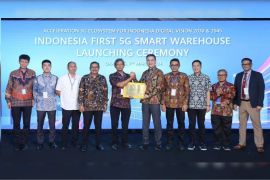Jakarta (ANTARA) - As the world’s largest archipelago, Indonesia still has a very rich opportunity to maximize its potential. As of now, only 10 percent of Indonesia’s maritime wealth is enjoyed by both state and citizen, while the ocean ecosystem potential awaits to be fully tapped as the country marches towards industry 4.0 in line with its vision of becoming a Global Maritime Fulcrum.
Government efforts to make the Global Maritime Fulcrum strategy a reality are inseparable from the usage of advanced, smart technologies. This is the focal point of discussion at the webinar entitled Recover Together and Recover Stronger: Technology Audit for Smart Maritime and Smart Agriculture, organized by the IATI together with KORIKA.
The event was supported by the Coordinating Ministry of Maritime and Investment Affairs, the Ministry of Marine Affairs and Fisheries, and technology provider Huawei.
Huawei and its partners Pilot National Library for Marine Science and Technology (Qingdao) and Highlander Digital Technology Co., Ltd. gave information on Smart Maritime technology usage, which has already been implemented in China. This technology contains a number of technologies, namely ocean mapping, maritime information processing, maritime big data and AI platform, and smart application platform. These capabilities can be applied to activities such as fisheries, maritime resources exploration, ocean conservation, and early warning systems.
Luhut Binsar Pandjaitan, Coordinating Minister for Maritime and Investment Affairs of the Republic of Indonesia, reminded again of the importance of smart agromaritime and smart agriculture in post-pandemic scenario to help jack up Indonesia’s maritime and agricultural product supply chains, in order to better contribute to a higher economic growth for Indonesia.
“As a result of relatively controlled COVID-19 pandemic situation, we can see a speedy economic recovery. We estimate to achieve a solid economic growth by around 5% to 6% until 2024, partly to the robust industry developments to support Indonesian digital economy and green economy. Improved production techniques will boost productivity and efficiency. In that light, smart agro-maritime and smart agriculture can help scale up productivity, data and information, excellent human resources, digital marketing that help distribute agriculture and maritime products to the global markets,” Luhut affirmed.
As Chinese technology, in which Huawei and its global technology partners lead the industry, these would definitely advance the smart maritime and smart agriculture in the country.
Similarly, Sakti Wahyu Trenggono, Minister of Marine Affairs and Fisheries of the Republic of Indonesia, said, “Digital transformation application is a chief option every ministry should choose in order to improve performance and quality services to the public. The achievement made in the government’s digital transformation has become inseparable work-culture and carry benefit for the public in general. For that, collaboration involving the government and various stakeholders in technology, is critically needed in marine and fisheries development, as we now did through this important event.”
Meanwhile, Bambang Brodjonegoro, founder of KORIKA, added, “Digital technologies offer invaluable contributions to every industry sector, maritime and fisheries notwithstanding. Operational effectiveness and efficiency are only some of the benefits that digital technologies can offer. Our highest appreciation to Huawei and its partners for sharing its experience and knowledge, and hopefully other technology players can also share their experience for case studies and benchmarking purposes by government and stakeholders both.”
Jason Zhang, President of Indonesia Huawei Cloud, added further, “An increased investment by government and industry in the maritime sector means that digital technology utilization will have more strategic value. Huawei and its partners want to help realize the government’s Global Maritime Fulcrum strategy through technology- and knowledge-sharing activities, starting with today’s webinar. Government, industry, academia, communities, and other stakeholders can provide advanced digital technologies to the maritime field together.”
Concurred with Jason, IATI/KORIKA chairman Hammam Riza said the orchestration of innovation ecosystem should be built by engaging the entire quad-helix Academic, Business, Community, Government ecosystem with Huawei as one of the key engines.
Reporter: PR Wire
Editor: PR Wire
Copyright © ANTARA 2022












